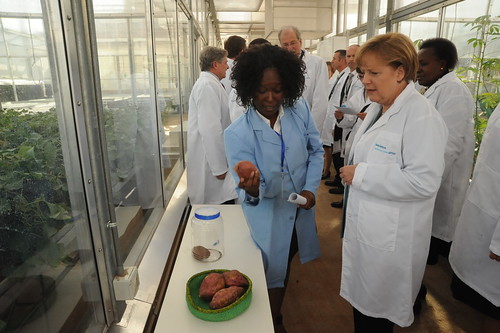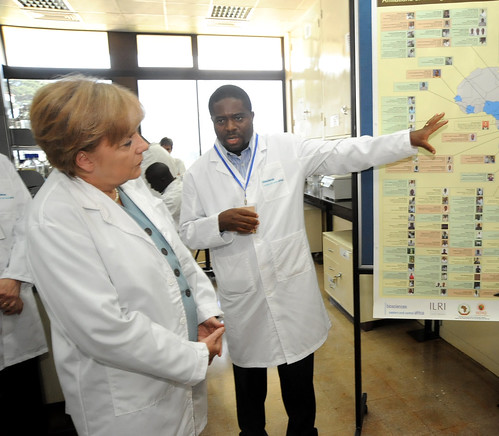Lydia Wamalwa talks with German Chancellor (and former scientist) Angela Merkel at ILRI-BecA labs (photo credit: ILRI/Njoroge).
Yesterday (12 Jul 2011), Lydia Wamalwa, a PhD student from the International Potato Center doing her research at the Biosciences eastern and central Africa (BecA) labs at the International Livestock Research Institute (ILRI), gave Chancellor Angela Merkel an overview of her research to improve the resistance of sweet potato to the sweet potato weevil, a pest that causes major losses to this, the third most important food crop in eastern and southern Africa.
Apollinaire Djikeng, BecA’s technology manager, introduces BecA, which is hosted and managed by ILRI, to Chancellor Merkel (photo credit: ILRI/Njoroge).
On the same lab tour, the Chancellor also heard from Appolinaire Djikeng, a Camerounian bioscientist who is BecA’s technology manager.
Djikeng explained that ILRI established BecA in 2006 with the New Partnership for Africa’s Development and funding from Canada. BecA provides state-of-the-art laboratory facilities to African scientists conducting research on the continent’s biggest food production problems.
In its first 5 years of operation, Djikeng said that BecA has:
- strengthened biosciences capacity in the region and trained hundreds of young African agricultural scientists;
- generated productive collaborations between dozens of scientists working in Africa with other experts working in Germany and elsewhere in Europe, in North America and in Asia; and
- convened donor representatives, agricultural scientists and civil society leaders in dozens of high-quality meetings to identify research gaps and ways to close them.
‘You’re now standing in BecA’s crop research laboratory,’ Djikeng said. ‘Many institutes have recently relocated their agricultural research programs here to take advantage of BecA’s resources, unique in sub-Saharan Africa.’
Among the international teams hosted by ILRI-BecA are those leading work on:
- cassava, banana and yams (IITA [International Institute for Tropical Agriculture], based in West Africa)
- sorghum, millet and other cereals of drylands (ICRISAT [International Centre for Research in the Semi-Arid Tropics], based in India)
- potato and sweet potato (CIP [International Potato Center], based in Peru), and
- drought-tolerant maize for Africa (CIMMYT [International Maize and Wheat Improvement Centre], based in Mexico).
One of BecA’s trainees, Rachel Aye, then told the Chancellor about how German support and BecA facilities are enabling her to advance development of a vaccine against a disease that is ravaging the livestock of Africa, including in her country, Uganda.
Djikeng and Aye thanked Chancellor Merkel on behalf of all their colleagues for making this historic visit and for her country’s longstanding support of agricultural research for development.


